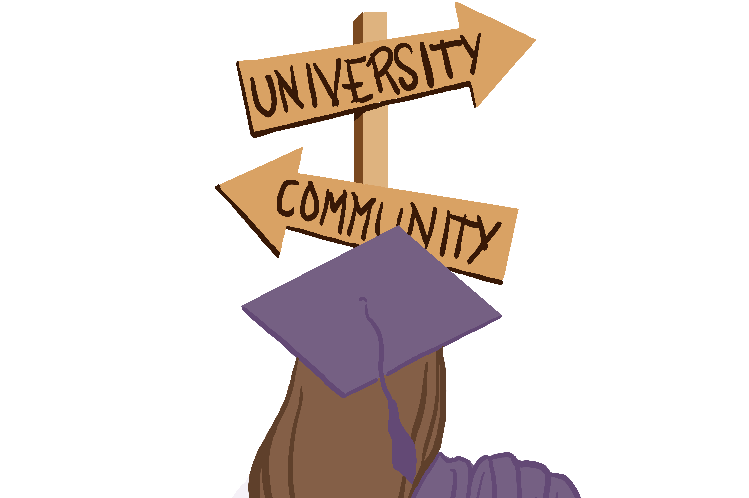University. The magical experience that will leave you with lifelong friends, an emotional connection to ramen noodles and $40,000 in student loan debt, according to USA Today. Who can say no to that? We can. Despite some of the benefits that come along with attending a typical four-year university, 55% (31/56) of TKC staffers agreed that attending a community college can be a legitimate alternative.
There are many reasons why high school students choose to attend a traditional college: experiencing Greek Life, living in a dorm and having access to more major-specific classes. However, we believe students should start overlooking these details and look further into the benefits that come along with a community college.
There’s no denying the drastic difference between the cost of community college versus the cost of university. While attending a university, you’re not just paying for classes, you’re paying for overpriced dining hall food and housing that’s either scorching or snowy. At community college, students are given the opportunity to commute from home rather than being forced to pay for an overpriced dorm room. This was just one of the many benefits Kaylee Caciatoree, freshman at St. Louis Community College– Meramec, said she saw when debating attending a traditional college or community.
“When I first started looking at colleges, cost wasn’t a huge concern for me,” Caciatoree said. “But when I saw [the price difference] I knew choosing [community college would be] the best decision I ever made.”
Caciatoree now spends a total of $1,000 a year on tuition and said saving so much money makes her feel smarter than most university students. She said she recommends community college to any high schooler looking to save money and get a good education, as you’ll receive access to the same required general courses offered at most universities at a fraction of the price.
You may think that the price of university tuition won’t be too bad after financial aid. Financial aid, otherwise known as FAFSA, can be extremely helpful for many people, however, it can be a burden to complete the numerous forms required. With the combination of what seems to be millions of frustrating questions plus application costs, applying for financial aid can be confusing and way more complicated than it needs to be. Why do we have to fill out 86 questions asking for our entire life story just to get an affordable education? And even that can be questionable, sometimes the amount of money students receive from FAFSA simply isn’t enough.
Financial aid is still offered for most community colleges, but many people find they don’t need it. With an average cost of $5,000 a year according to stlcc.edu, community college has an insane price difference compared to even the cheapest universities. This makes community college an excellent alternative for students looking to avoid crippling student loans.
So what are the real benefits of a university? While a typical university may have more specialized classes, many community colleges offer the same traditional courses required by universities. This makes it easy for students to take required general classes at a cheaper community college before transferring to a four-year institution to move onto more specialized courses.
But what are we really paying for if these classes somewhat follow the same coursework? 7 a.m. classes with class sizes up to 60 people? Both these annoyances are avoidable at community college. Thanks to the wide range of students attending community college, most colleges offer more night classes and a wider range of class times. The same goes for class sizes. Due to the smaller campus size and larger spectrum of class times, typical community college class sizes are closer to a high school class, reaching around 30 students at most, which allows students to build a better connection with professors and receive more personalized feedback/teaching.
The debate on whether a university or community college is more beneficial will forever be controversial, and while community college has been proven to offer students with a great education at a lower cost, the true answer always depends on the person. Despite this, TKC staff voted that in most cases, choosing a community college can be equally beneficial if not more than a university.





